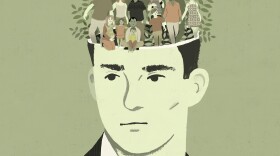
Shankar Vedantam
Shankar Vedantam is NPR's social science correspondent and the host of Hidden Brain. The focus of his reporting is on human behavior and the social sciences, and how research in those fields can get listeners to think about the news in unusual and interesting ways. Hidden Brain is among the most popular podcasts in the world, with over two million downloads per week. The Hidden Brain radio show is featured on some 250 public radio stations across the United States.
Before joining NPR in 2011, Vedantam spent 10 years as a reporter at The Washington Post. From 2007 to 2009, he also wrote the Department of Human Behaviorcolumn for the Post.
Vedantam and Hidden Brain have been recognized with the Edward R. Murrow Award, and honors from the American Association for the Advancement of Science, the Society for Personality and Social Psychology, the International Society of Political Psychology, the Society of Professional Journalists, the National Association of Black Journalists, the Austen Riggs Center, the American Psychoanalytic Association, the Webby Awards, the Pennsylvania Associated Press Managing Editors, the South Asian Journalists Association, the Asian American Journalists Association, the Pennsylvania Newspaper Association, the American Public Health Association, the Templeton-Cambridge Fellowship on Science and Religion and the Rosalynn Carter Mental Health Journalism Fellowship.
From 2009 to 2010, Vedantam served as a fellow at the Nieman Foundation for Journalism at Harvard University.
Vedantam is the author of the non-fiction book The Hidden Brain: How Our Unconscious Minds Elect Presidents, Control Markets, Wage Wars and Save Our Lives. The book, published in 2010, describes how unconscious biases influence people.
Outside of journalism, Vedantam has written fiction and plays. His short story-collection, The Ghosts of Kashmir, was published in 2005. The previous year, the Brick Playhouse in Philadelphia produced his full-length comedy, Tom, Dick and Harriet.
Vedantam has served as a part-time lecturer at Harvard University and Columbia University. He has also served as a senior scholar at the Woodrow Wilson International Center in Washington.
-
A culture of racism can infect us all. On this week's radio show, we discuss the implicit biases we carry that have been forged by the society around us.
-
Flight delays and late arrivals have gone down since 1990. At the same time, airlines have increased scheduled flight times because flights are taking longer, and more time is spent taxiing.
-
Barbara Wolfe and Jason Fletcher at the University of Wisconsin-Madison found children from lower income families have lower non-cognitive skills than children from richer families.
-
Unpredictable things happen to us all the time. On this Radio Replay, we mark the new year with two of our favorite stories of loss and the change it brings.
-
Chaos is a part of all of our lives. Sometimes we try to control it. And other times, we just have to live with it. On this week's Radio Replay, we explore different strategies for coping with chaos.
-
If you believe something is real — if you can fall in love with someone or stand in awe of a painting — is it possible that it doesn't actually matter whether the object of your affection is fake?
-
What is it that makes you...you? NPR's Shankar Vedantam explores new research that suggests the labels we use to categorize people affect not just who they are now, but who they'll be in the future.
-
A study looks at the effect of housing vouchers on criminal activity. People who receive Section 8 vouchers are more likely to be arrested for violent crimes, but this effect only shows up for men.
-
It's in our nature to idolize the rich and famous. But this week on Hidden Brain, we explore the other side of our nature: the part of us that wants to see the rich and powerful fall from grace.
-
Young people have always used language in new ways, and it has always driven older people crazy. But the linguist John McWhorter says all the LOLs are part of an inevitable evolution of language.










